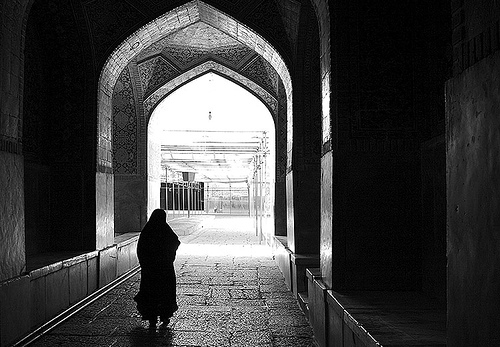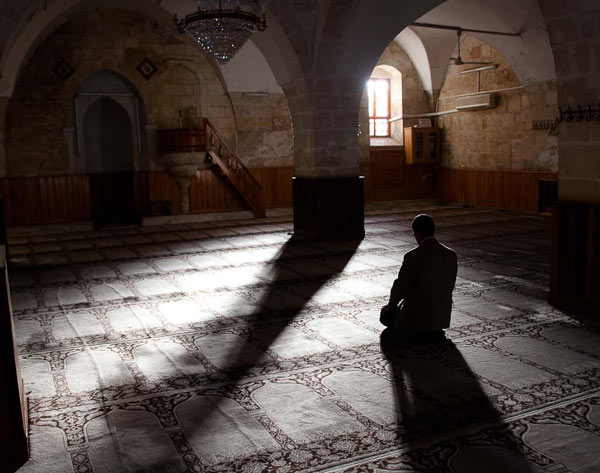Question:
What is the meaning of Laylatul Qadr?
Answer:
In order to answer this question, we must consider Surat al-Qadr, chapter 97 of the Holy Quran.
إِنَّا أَنْزَلْنَاهُ فِي لَيْلَةِ الْقَدْرِ ‘We revealed it in the Night of Qadr’ (97:1)
In this Surah Allah (swt) does not disclose what He revealed. ‘إِنَّا أَنْزَلْنَاهُ’, the ‘hu’ is the pronoun, and therefore it is translated as ‘We revealed it…’.
The interpreters of the Quran are unanimous however, that the pronoun of ‘hu’ refers to the Quran itself. In the beginning of Surat ad-Dukhan (chapter 44), Allah (swt) mentions that إِنَّا أَنْزَلْنَاهُ فِي لَيْلَةٍ مُبَارَكَةٍ ‘We have revealed it in a blessed night’. Again here, we have the same problem of ‘Innaa anzalnaahu’. But what we understand from these Ayaat is that something is revealed in the Night of Qadr, and that Night is a blessed night.
As the Ayaat of the Quran interpret each other, in Surat al-Baqarah (chapter 2), we find that when Allah (swt) talks about the obligation of fasting in the month of Ramadan, He says that شَهْرُ رَمَضَانَ الَّذِي أُنْزِلَ فِيهِ الْقُرْآنُ ‘The month of Ramadan, (in which) the Quran was revealed’ (2:185). So when you put the so-called pieces of the puzzle together, it becomes meaningful. One of the conclusions we derive is that the Night of Qadr must be in the month of Ramadan.
A question arises here though: what is the meaning of Laylatul Qadr? Laylah means night, but what does Qadr mean?
Very often in English translations of the Quran, they write the Night of Power. That is one of the seven possible meanings that I will list here, but it is not the best translation. According to the narrations and supplications of Ahlul Bayt (a.s), there is a better translation for al-Qadr. The term ‘al-Qadr’ in the Quran is used in different contexts with different meanings.
1) The Night of Power
One of the meanings of ‘al-Qadr’ in the Quran is power, there is no doubt about this. إِنَّ اللَّهَ عَلَىٰ كُلِّ شَيْءٍ قَدِيرٌ ‘Surely God has the power to do all things’ (24:45 and others). قَدِيرٌ ‘Qadeer’ is from the same root of قَدْرِ ‘Qadr’. So it is possible to translate Laylatul Qadr as ‘the Night of Power’.
2) The Night of Decree/Destiny
Another meaning of Qadr used in the Quran is when the Almighty God is decreeing the destiny of humans. E.g. نَحْنُ قَدَّرْنَا بَيْنَكُمُ الْمَوْتَ (It is Us (referring to God’s majesty) that is decreeing death among you) (56:60). No matter what you do, eventually we are all mortal beings and thus destined to die. So the final destination that I will meet (i.e. death) is decreed by God. This ordainment by God is called ‘al-Qadr’ or ‘Divine Decree’ and ‘Destiny’.
In the beginning of Surat Dukhan Allah (swt) emphasises that فِيهَا يُفْرَقُ كُلُّ أَمْرٍ حَكِيمٍ (in it (this night) every matter of ordainment is decreed). That is why I said that according to the narrations and supplications of Ahlul Bayt (a.s) – which are numerous and unique on this issue –Laylatul Qadr means ‘The Night of Decree’ or ‘The Night of Destiny’, the Night when all our destinies will be determined. This is the best translation of Laylatul Qadr.
The question here is: what is the meaning of The Night of Destiny? What if I fall asleep on Laylatul Qadr and miss out on the worshipping acts that have been recommended? It raises issues related to determinism and free will. Is our destiny in our hands or is God decreeing and determining it on Laylatul Qadr? The Quran clearly states: فِيهَا يُفْرَقُ كُلُّ أَمْرٍ حَكِيمٍ (in it (this night) every matter of ordainment is decreed). In addition, the narrations of Ahlul Bayt (a.s) are very clear about this, so what is meant by The Night of Destiny?
In a nutshell, the answer is that the Almighty God, due to His wisdom and knowledge, determines all matters, whether you like it or not. Someone came to Imam Sadiq (a.s) and asked the same question, attempting to be philosophical to the Imam during the Night of Qadr. He said ‘O’ dear son of the Messenger of God, you said that matters will be decreed, but isn’t this determinism, you tell us there is no absolute determinism?’ The Imam replied that ‘that’s how the reality of the matter is, and tonight is not the night for debates’.
However, it can be said that yes, the Almighty God determines the affairs, but at the same time, He has favoured the believers by introducing them to Laylatul Qadr, letting us know that there is a very blessed and holy night in the month of Ramadan – which is either on the 19th, 21st, or 23rd of Ramadan – in these nights, seek Allah’s forgiveness, seek whatever you need and want from God. So God is saying that yes, I am the One that decrees all matters, but I have also introduced to you Laylatul Qadr. Take the opportunity to worship Me and ask for forgiveness and your needs, before I decree your affairs. If one falls asleep, takes a nap, and does not ask God for his needs, then he has no one to blame but himself. The Merciful God has reserved a place for every person in Paradise, but unless you ask Him, it may not be given to you!
3) The Valuable Night
‘Qadr’ in the Arabic language is something that has ‘qeemah’ or value. So Laylatul Qadr means ‘The Valuable Night’.
SubhanAllah, look at the beauty of God’s work. The whole month of Ramadan is a beautiful excuse to get use to waking up for suhoor, to train and show us that we can also be like those friends of God. Some of the youth tell me that they find it too difficult to wake up for the Night Prayers (Salatul Layl), yet when the month of Ramadan comes even many children are awake during that time! Eating Suhoor is only an excuse to get us into the good habit of waking up at dawn. So, if you can get up for suhoor, surely you can get up for the night prayer – especially since this prayer elevates your status.
Why is the night of Qadr a valuable night? Because it is the night in which the Quran was revealed, or it is the night of the commencement of the revelation of the Quran.
It is also a valuable night because Allah (swt) says that: إِنَّا أَنْزَلْنَاهُ فِي لَيْلَةٍ مُبَارَكَةٍ ‘Surely we have revealed it in a blessed night’ (44:3). Because Allah (swt) is the Source of all blessings, the words of God are also blessed, and so is the night in which the words of God were revealed.
Consider this example: a cup with water in it has no smell, but if that same cup is filled with perfume instead, then surely that cup will now emit a fragrance. Similarly, the Night of Qadr is no different to other nights – in the normal sense of the term night – yet the difference is in what happens in it. Because in the Night of Qadr the Quran is revealed, then this night has a different fragrance and smell. It becomes a blessed and valuable night, because of what happens in it.
Another proof for the great value and importance of Laylatul Qadr, hence consistently attracting the believers to the mosques and houses of God, can be seen in the way Allah (swt) converses with the Prophet (s): وَمَا أَدْرَاكَ مَا لَيْلَةُ الْقَدْرِ ‘And what will make you comprehend what the Night of Qadr is?’ (97:2).
God is talking to the Prophet (s) who receives the revelation – the knowledge of the Prophet (s) is of no comparison to anybody else, yet the Quran says وَمَا أَدْرَاكَ مَا لَيْلَةُ الْقَدْرِ ‘And what will make you comprehend what the Night of Qadr is?’. That means that it is such a wonderful, blessed, and important night. The narrations say that after the Prophet (s) received that revelation, he said ‘(Indeed) I do not know what it means’.
Another reason why Laylatul Qadr is so important and valuable is because – again referring to Surat al-Qadr – Allah (swt) refers to it as the only night of the year in which angels – not one but many – and ‘al-rooh’ descend to Earth for every matter. In other words, if you seek something this is your opportunity on this night.
And finally, it is also ‘The Valuable Night’ because it is the night of peace (salam).
4) The Night of the Quran
It is for this reason that on Laylatul Qadr, we put the words of God; the Quran, on our heads out of respect. We then ask Allah (swt) by every letter and sentence of the Quran.
Why the Night of Quran though? Because the Quran is revealed in this night. Think of the cup and perfume example I gave earlier.
There is a bit of calculations behind this as well. The words of Surat al-Qadr are 30 words, the same number of the Ajzaa’ or sections of the Quran. In addition, the letters of Surat al-Qadr are 114, the same as the number of chapters in the Holy Quran. Mind you, the interpreters of the Quran disagree on the counting of the various words and letters of the Quran, but when it comes to Surat al-Qadr, there is amazingly no dispute: 30 words and 114 letters!
5) Laylatul Qadr is the Night of Wilayah
Whatever Allah (swt) decrees in this night, He does it through the means that He has introduced to us, that is, the Ahlul Bayt (a.s), who are the direct link between us and the Almighty God.
My teacher Ayatollah Hassan-Zadeh Amuli said in one of his lessons:
‘I spent so much time trying to understand the meaning of Laylatul Qadr, and I could not come across something convincing. I asked my teacher about the meaning of Laylatul Qadr, and he told me to consider the hadith that is narrated from Imam Sadiq (a.s) about Laylatul Qadr, in which the Imam introduces the Night to mean Fatima (a.s)!’
The narration referred to by Ayatollah Hassan-Zadeh’s teacher is in a one-volume Tafsir compiled more than 1,000 years ago, Tafsir Furat al-Kufi. Under the interpretation of Surat al-Qadr, it is narrated from Imam Sadiq (a.s) that ‘whoever comprehends the status of Fatima al-Zahra (a.s) as she deserves to be known, he/she has comprehended Laylatul Qadr.’
So the Night of Qadr is the Night of Wilayah as well. It is for this reason that after we place the Holy Quran upon our head and ask Allah (swt) by every word and letter (to grant us our needs), we go to the 14 Ma’sumeen, ‘Bi Muhammadin, Bi Alliyyin, Bi Fatima…’, because nothing comes to us and our prayers will not be elevated to the Almighty God unless the Ahlul Bayt (a.s) have endorsed it.
6) Laylatul Qadr means Qadrul-Laylah
In other words, the Almighty God found an excuse to call all of us to the mosque, so that we value the nights of our lives. I have made a bit of calculations according to Surat al-Qadr:
If someone lives for 80 years or more, I’m sure you would agree that he/she has been lucky and lived a long life. When the Quran says that Laylatul Qadr is better than 1,000 months, 1,000 months equals about 83 years. Let’s assume it is 80 years. If I live for 80 years in this world, half of it are days, the other half are nights on average – 40 years of days, 40 years of night. As for the days, we are busy with our own affairs. So for 40 years, we spend it on worldly matters or other things that have to be carried out. As for the nights, we said that they are on average 12 hours (12 hours per night over 40 years). Now ask any doctor, you don’t need more than 6 hours sleep. If you sleep for a good six hours, your body will be rejuvenated and you will be alright. More than that is laziness and habit. Surely you can reduce it to six hours. I tell you that you can also reduce it to less than 6 hours if you want, but 6 hours is good average sleep. So if 6 hours are spent on sleeping, then that is 20 years all up from the 40 years of night. What about the other 20 years of night in my life? What have I been doing in those 20 years?
So Laylatul Qadr is meant to get me to think: am I valuing the nights of my life or not? Some people spend it on chatting on the net, browsing on different sites, some just watch movies. Just killing time, with no plan for their lives. Hanging around with their friends, wandering around in the city – they have to somehow pass time and they don’t know what to do with it. Laylatul Qadr has a message for us: my friend, we are talking about 20 years! You can do so much with this time! Students who succeed at school or university know that the difference is made at night. When his classmates are asleep, he is up studying, and that is how he can make a difference.
Whether for worldly gain or the hereafter, those who are awake at night can make a difference, and they can proceed faster. So in a nutshell, Laylatul Qadr is to teach us to value the nights of our lives, and not to allow them to pass by and go to waste.
7) Laylatul Qadr as in ‘Dheeq’ (lack of space)
Finally one of the possible meanings of the Night of Qadr is the Night of lack of space. According to some narrations so many Angels are descending to Earth for every matter during that night, which will make it as if there is the congestion of Angels!
Answered by: Sheikh Mansour Leghaei
Subscribe to our mailing list!






